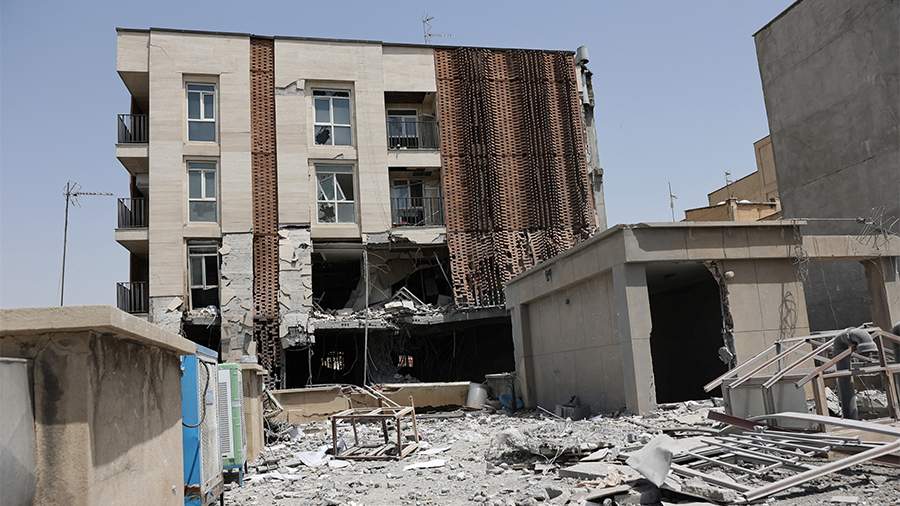The debate over the strikes on Iran continues in the United States. What the media is writing
- Новости
- World
- The debate over the strikes on Iran continues in the United States. What the media is writing

The United States wants to conclude a deal with Iran on the development of nuclear energy and is ready to lift sanctions for this. At the same time, Tehran denies the possibility of negotiating with Washington. U.S. senators were divided on the effectiveness of strikes on nuclear facilities after hearing the Pentagon's report. What the world's media write about the consequences of the conflict is in the Izvestia digest.
CNN: The United States wants to make a deal with Iran on the creation of nuclear energy
The administration of US President Donald Trump is discussing the possibility of providing Iran with access to the amount of $30 billion to create a civilian nuclear power industry, ease sanctions and unfreeze billions of dollars of Iranian assets. All of this is part of an increasing effort to bring Tehran back to the negotiating table. Key figures from the United States and the Middle East have been negotiating with the Iranians behind the scenes even amid the strikes in Iran and Israel over the past two weeks. These discussions continued after the conclusion of the ceasefire agreement.
CNN
Trump administration officials stressed that several proposals had been put forward. They are preliminary and developing with one consistent, non-negotiable point: zero uranium enrichment, which Iran claims it needs. But at least one preliminary draft proposal, described by two sources, includes several incentives for Iran.
One of the officials insisted that the money would not come directly from the United States. Washington prefers that its Arab partners pay the bills. Investments in Iran's nuclear energy facilities have been discussed at previous rounds of nuclear talks in recent months. Another idea is that US-backed allies in the Persian Gulf will have to pay for the replacement of the Fordo nuclear facility, which the US hit with bunker buster bombs.
The Washington Post: US senators are divided on the issue of strikes on Iran
U.S. senators held a secret briefing on the results of strikes on Iran's nuclear facilities and were divided along partisan lines in their attitude towards them. Republicans said they had strengthened their faith in the effectiveness of the strikes, and some Democrats complained that he did not provide comprehensive answers to their questions.
The Washington Post
Secretary of State Marco Rubio, Secretary of Defense Pete Hegseth, CIA Director John Ratcliffe, and General Dan Kane, chairman of the Joint Chiefs of Staff, briefed senators after days of complaints from Democrats that the administration had not informed them of how much damage last weekend's strikes had done to Iran's nuclear program.
Senate Minority Leader Charles Schumer said the briefing raised more questions than it answered, and that he would insist on more details. Democratic Senator Chris Murphy said that, in his opinion, Iran's nuclear program was set back just a few months ago. At the same time, Republican Tom Cotton said the strikes had caused "catastrophic damage."
The New York Times: The fate of Iran's enriched uranium remains unclear
After days of debate about how badly the U.S. strikes damaged three nuclear facilities in Iran, the fate of the country's enriched uranium reserves remains a mystery. Over the years, as Iran has built up its underground nuclear facilities and centrifuges, it has accumulated a large stockpile of uranium enriched to 60%, which is close to the level suitable for making a bomb.
The New York Times
American intelligence agencies have long estimated that, faced with the possibility of an attack on its nuclear facilities, Iran will try to export its enriched uranium reserves in order to either preserve them as a lever of influence in diplomatic negotiations or use them in the race to build a bomb. In an interview on Sunday, Vice President J.D. Vance said U.S. officials would like to talk to Iran about the reserves. But on Thursday, the Trump administration rejected the idea that Iran was able to move its enriched uranium before the U.S. strike.
American officials say that the intelligence gathered so far about the uranium arsenal is contradictory. The IAEA said the Iranians had informed inspectors of plans to move the material if they considered it to be at risk. It was stored in containers that are small enough to fit in the "trunk of an ordinary car." In the days leading up to the US attack on Isfahan, there was evidence that vehicles were transporting something to or from the labs.
Bloomberg: Iran denies the possibility of negotiations with the United States
Iran denies that it plans to resume nuclear talks with the United States. This reduces the prospects for a diplomatic approach after Trump suggested that an agreement could be reached as early as next week. It would be the first meeting between the two countries since the 12-day war between Iran and Israel disrupted diplomatic efforts to resolve tensions over Tehran's nuclear program.
Bloomberg
"I openly declare that there was no agreement, arrangement or discussion regarding the start of new negotiations," Foreign Minister Abbas Araghchi said in an interview with state television on Thursday evening. "Some assumptions about the resumption of negotiations should not be taken seriously."
Araghchi also rejected a request from UN inspectors to assess the scale of damage at nuclear facilities bombed by the United States and Israel, which he called "significant and serious." Although some Iranian officials, including President Masoud Pezeshkian, have declared their willingness to negotiate, they face resistance from others. Supreme Leader Ali Khamenei said yesterday that his country had won the war, but did not say whether negotiations with the United States should now resume.
Переведено сервисом «Яндекс Переводчик»
